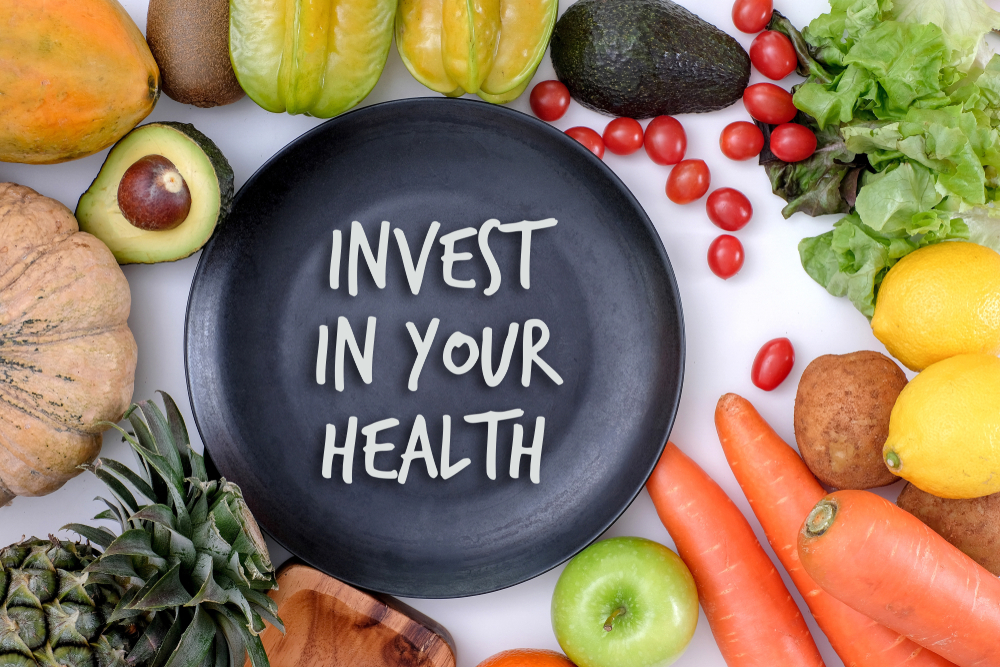Holistic Nutrition for Stress-Induced Weight Management

Table of Contents
In today’s fast-paced world, stress has become a common factor influencing many aspects of our lives, including weight management. The impact of stress on our eating habits and overall well-being cannot be understated. In this article, we’ll explore how holistic nutrition can be a powerful tool for managing weight in the face of stress, touching upon natural remedies and dietary adjustments to help achieve a healthier balance.
Understanding Stress-Induced Weight Gain
Stress sneaks into our lives, often shaking up our eating patterns and the way our body deals with calories. It’s like a hidden puppeteer, pulling strings that lead to weight gain even when we think we’re eating right. If you’ve ever found yourself reaching for a candy bar or bag of chips when the pressure’s on, you’re not alone. But don’t worry—we’re about to unravel the mystery of how stress messes with our weight and what we can do to take back control.
The Link Between Stress and Weight Gain
Have you ever noticed that during stressful times, your jeans might start to feel a bit snugger around the waist? That’s no coincidence. When stress barges into our lives, it doesn’t knock politely; it bursts right in and can throw our weight for a loop. Cortisol, known as the stress hormone, gets released into our bloodstream whenever we’re under pressure. But here’s the kicker – cortisol has a sweet tooth. It amps up our cravings for sugary, fatty, and all-around comfort foods that aren’t always the best choices for our waistline.
Not just that, but stress can mess with our eating patterns. Some folks might skip meals due to a tossed-up schedule or eat on the run, which means they’re not giving their bodies the chance to properly process what’s being consumed. Before we know it, we’re either overeating or opting for quick fixes that don’t provide lasting energy. And that’s how stress can become a sneaky culprit behind weight gain, nudging our bodies to store fat, especially around the midsection, making it tough to keep a balanced weight.
Effects of Stress on Eating Habits
Stress hits us all, and it can play a big role in how we eat. Have you ever noticed how, when the pressure is on, you reach for a snack? That’s because stress can mess with our hunger signals. In fact, it often leads us to crave foods that are high in sugar and fat — not exactly the best choices when we’re trying to stay healthy.
It’s like our body’s on autopilot, reaching for comfort food whenever we feel overwhelmed or anxious. But here’s the thing: those quick fixes can lead to some long-term issues like unexpected weight gain. The key is to recognize these habits early on. That way, we can make smarter choices that support our bodies and our minds, even when life gets hectic.
Principles of Holistic Nutrition for Stress Management

When we talk about dealing with stress and keeping our weight in check, digging into the roots of holistic nutrition can work wonders. It’s all about the goodness of whole foods and packing our meals with nutrients that not only fuel our bodies but also soothe our minds. From colorful fruits and veggies to calming herbs, embracing these principles can be a game changer in how we feel every day.
Emphasizing Whole Foods and Nutrient-Dense Ingredients
When we talk about feeding our bodies to combat stress, whole foods come in as real superheroes. These are the foods that are closest to their natural state as possible – think fresh fruits, crunchy vegetables, hearty grains, and quality proteins. They pack a punch of essential nutrients like vitamins, minerals, and antioxidants without the added sugars and preservatives found in processed foods.
Let’s make it simple: eating foods rich in nutrients helps our body’s stress response. It’s like giving your body the armor it needs to shield itself from stress’s sneak attacks. So, reaching for an apple instead of a candy bar not only helps with weight management but also equips you to better handle stressful situations. It’s a double win!
Incorporating Stress-Reducing Foods and Herbs
When life gets hectic and worries pile up, the meals we choose can play a huge role in how we cope. Adopting a diet rich in foods and herbs known for their stress-relieving properties can be a game-changer. Foods like avocados, berries, nuts, and seeds are loaded with beneficial nutrients that help stabilize mood and reduce anxiety levels. They contain essential vitamins, minerals, and antioxidants that support your body when it’s under pressure.
It’s not just food; certain herbs have a long history of aiding in relaxation. Herbs like ashwagandha, lavender, and chamomile are nature’s stress relievers. Sipping on chamomile tea, for instance, can be a soothing ritual to end your day, as it’s been shown to help you unwind and even sleep better. And remember, integrating these ingredients into your diet isn’t just about reducing stress—it’s about enriching your overall quality of life.
Mindful Eating Practices for Stress Relief and Weight Management

Eating is not just a way to fill up your stomach; it can be a tool to help you deal with life’s pressures. Imagine turning every meal into a mini-vacation from stress. Mindful eating is exactly that – it’s a technique where you fully pay attention to your food and how you eat. It allows you to tune into your body’s true hunger signals, enjoy your meals, and stop the cycle of stress eating. Plus, when you’re attentive to what you’re putting into your body, you’re more likely to make healthier choices that support both stress reduction and weight control.
Practicing Mindful Eating Techniques
Ever find yourself chomping down a whole bag of chips while zoning out in front of the TV? That’s the opposite of mindful eating, and it can be a real roadblock if you’re trying to manage your weight when stressed. Mindful eating is all about paying attention to what, when, and how we eat. It’s like putting the brakes on a habit of snacking nonstop and waking up to what’s on your plate.
By focusing on the flavors, textures, and even the colors of your food, you turn eating into a moment to cherish, not just a quick pit stop. This means sitting down, putting away the phone, and really tuning in to each bite. It helps you listen to your body’s hunger cues and can keep you from overeating. Plus, it turns meals into a time of relaxation instead of just another task on your to-do list.
Developing Balanced and Nourishing Meal Plans
Creating meal plans that promote balance and nourishment is key to combating stress-related weight issues. The goal is to craft a roadmap for your meals that focuses on variety, balance, and nutrient-dense foods. To start, think about including proteins, fats, and carbohydrates in every meal – these are the macronutrients your body needs to function at its best.
For example, breakfast could be a smoothie packed with fruits, greens, a scoop of protein powder, and a splash of almond milk. Lunch and dinner can follow a simple template: half the plate filled with vegetables, a quarter with lean protein such as chicken or tofu, and the remaining quarter with whole grains like quinoa or brown rice. Adding herbs and spices not only amps up flavor but also brings in additional health benefits, making your meals both tasty and therapeutic. Remember, the colors on your plate reflect a range of nutrients – so color it up!
The Role of Lifestyle Modifications in Holistic Nutrition

When talking about eating right to deal with stress, we can’t ignore how changing our daily routines plays a huge part. Whether it’s getting enough sleep or moving your body, these changes can help you keep a calm mind and a healthy weight. It’s like a magic circle – good habits help reduce stress, and less stress makes it easier to stick to those good habits. Let’s dive in and see how tweaking your lifestyle can make a big impact.
Managing Sleep and Stress Levels
Getting a good night’s sleep is like hitting the reset button on your body and mind. When you’re well-rested, you feel sharper, and your body can handle stress better. Poor sleep can throw a wrench in your metabolism, making it harder to maintain a healthy weight.
But here’s the scoop: it’s not just about how much you sleep, but also about how well you sleep. Stick to a bedtime routine that calms the mind. Maybe read a book, sip some chamomile tea, or meditate. These little rituals signal to your body that it’s time to wind down. Plus, checking your devices last thing before bed is a no-go. The blue light tricks your brain into thinking it’s daytime and messes with your sleep hormones. Stick to these tips, and you’re on your way to smoother sailing through stress and better weight management.
Incorporating Physical Activity for Stress Reduction
Getting active is one of the smartest moves you can make for stress relief. It’s like hitting a reset button for your mood. When you exercise, your body releases endorphins, which are natural mood lifters. Plus, it gives your mind something else to focus on aside from your worries.
Physical activity doesn’t have to mean hitting the gym or running marathons. Simple activities like walking, dancing, or even gardening can make a big difference. The key is to find something you enjoy, so it feels less like a chore and more like a treat for your body and mind.
Incorporating Holistic Nutrition into Daily Life

Making the switch to a more holistic approach to your diet doesn’t need to be tough or intimidating. Think of it as simply adding a variety of natural and nourishing foods to your meals that not only taste good but also help soothe your stress. It’s a gradual journey, and every small step can lead to big changes in how you feel and manage your weight. Let’s delve into how you can seamlessly infuse these nutrient-rich choices into your everyday life, creating habits that nourish both body and mind.
Simple and Healthy Stress-Busting Recipes
When it comes to tackling tension head-on, your dinner plate might hold more power than you think. Simple and healthy recipes not only nourish your body but can also help calm your mind. Focusing on meals that are as soothing to prepare as they are to eat can play a pivotal role in melting away stress.
Incorporating ingredients known for their relaxing properties is key. A warm, comforting bowl of oatmeal topped with antioxidant-rich blueberries and a drizzle of honey can set a tranquil tone for the day. For lunch, a quinoa salad bursting with crunchy veggies and topped with salmon, rich in omega-3 fatty acids, helps keep stress chemicals at bay. Dinner might feature a turkey and sweet potato stir-fry, as both are packed with nutrients that promote the production of serotonin, the brain’s feel-good neurotransmitter. Remember, recipes that keep it light, fresh, and unprocessed ensure you’re nourishing your body and lifting your mood.
Building a Supportive and Stress-Reducing Environment
Creating a supportive and stress-reducing environment can play a crucial role in maintaining a balanced lifestyle. It’s about shaping your surroundings to foster relaxation and positivity, which in turn can help manage stress levels. This isn’t just about the physical space you inhabit, but also about the emotional and social climates you engage with.
To build this environment, start by decluttering your living and workspaces. A tidy room equals a tidy mind, as they say. Surround yourself with calming colors and personal items that bring you joy. Don’t forget the importance of a strong support network; relationships with family and friends can be a huge source of comfort. Embrace practices like regular get-togethers or even joining community activities that align with your interests, fostering connections that nourish your soul and lighten your burdens.
Embracing Holistic Nutrition for Sustainable Weight Management and Stress Reduction
When it comes to keeping extra pounds at bay and banishing stress, it’s not just about counting calories or doing endless hours at the gym. It’s about nourishing your body and mind from the inside out. Holistic nutrition plays a major role in this process, serving as a bridge to a more tranquil life and a happier, healthier you.
By infusing your life with natural, nutrient-packed foods and mindful eating habits, you’re setting the table for lasting weight control and a cool, composed mindset. Say goodbye to quick fixes and embrace a way of eating that loves you back, leaving you feeling satisfied and at peace. Consider this: with every bite of a crunchy apple or a handful of almonds, you’re not just snacking – you’re taking a step toward a more balanced life.
Conclusion
By embracing the principles of holistic nutrition and adopting mindful eating practices, we can create a sustainable approach to weight management in the face of stress. With a focus on natural solutions and lifestyle adjustments, achieving a healthier balance becomes not only possible but also enjoyable. As we navigate the demands of modern life, holistic nutrition stands as a valuable cornerstone for managing stress-induced weight while fostering overall well-being.
FAQs
How can I reduce stress-induced weight gain?
- Regular Exercise: Engage in regular physical activity, as it helps to reduce stress and promotes overall well-being. Both aerobic exercises and strength training can be beneficial.
- Healthy Eating Habits: Maintain a balanced diet with a focus on whole, nutrient-dense foods. Avoid emotional eating and mindless snacking by being mindful of your food choices.
- Adequate Sleep: Ensure you get enough quality sleep, as lack of sleep can contribute to stress and weight gain. Aim for 7-9 hours of sleep per night.
- Stress Management Techniques: Incorporate stress-reducing activities into your routine, such as meditation, deep breathing exercises, yoga, or mindfulness practices.
- Social Support: Connect with friends and family. Sharing your feelings and experiences can provide emotional support and alleviate stress.
- Time Management: Organize your schedule to reduce stress. Prioritize tasks, set realistic goals, and allow time for relaxation.
What is the holistic approach to weight management?
- Balanced Nutrition: Focus on a well-rounded, nutrient-dense diet that includes a variety of fruits, vegetables, lean proteins, whole grains, and healthy fats.
- Regular Exercise: Incorporate both cardiovascular exercises and strength training into your routine for overall fitness.
- Adequate Hydration: Drink plenty of water throughout the day to support metabolism and overall health.
- Stress Management: Manage stress through techniques such as meditation, yoga, or deep breathing exercises.
- Adequate Sleep: Ensure you get enough quality sleep to support overall well-being and weight management.
- Behavioral Changes: Identify and address emotional triggers for unhealthy eating habits and develop strategies to modify behavior.
How do I stop losing weight when stressed?
- Monitor Caloric Intake: Ensure you are consuming enough calories to meet your body’s needs. Stress can sometimes lead to a reduced appetite, so focus on nutrient-dense foods.
- Regular Meals: Stick to regular meal times and try not to skip meals. Include a balance of carbohydrates, proteins, and fats in each meal.
- Consult a Professional: If you continue to lose weight despite your efforts, consult with a healthcare professional or a registered dietitian for personalized advice.
How do you get rid of stress belly fat?
- Regular Exercise: Engage in both aerobic exercises and strength training to burn calories and reduce overall body fat, including belly fat.
- Healthy Diet: Focus on a balanced diet that includes whole, unprocessed foods. Limit the intake of added sugars, refined carbohydrates, and unhealthy fats.
- Stress Management: Practice stress-reducing activities to lower cortisol levels, such as meditation, deep breathing exercises, or yoga.
- Adequate Sleep: Ensure you get enough quality sleep, as lack of sleep can contribute to stress and weight gain.
What foods reduce cortisol belly fat?
- Foods Rich in Omega-3 Fatty Acids: Fatty fish, flaxseeds, and chia seeds are sources of omega-3 fatty acids, which may help reduce cortisol levels.
- Dark Chocolate: Dark chocolate in moderation contains antioxidants and may have stress-reducing properties.
- Protein-Rich Foods: Include lean protein sources like poultry, fish, tofu, and legumes in your diet to help stabilize blood sugar levels and reduce cortisol.
- Fruits and Vegetables: Colorful fruits and vegetables provide antioxidants that support overall health and may help combat stress.
What is a natural cortisol blocker?
- Phosphatidylserine: Found in foods like fish and organ meats, it may help regulate cortisol levels.
- Ashwagandha: An adaptogenic herb that has been studied for its potential to reduce stress and cortisol levels.
- Rhodiola Rosea: Another adaptogenic herb that may help the body adapt to stress and modulate cortisol levels.
- Omega-3 Fatty Acids: Found in fatty fish, flaxseeds, and walnuts, omega-3s may help regulate cortisol production.
Useful resources
- Managing Stress-Induced Weight Gain with a Nutritious Diet: https://www.thelacavacenter.com/holistic-meal-plan-for-weight-loss – This practical guide delves into specific food choices and dietary strategies to combat stress-related weight gain.
- An Expert-Approved Diet Plan for a Less-Stressed You: https://www.everydayhealth.com/wellness/united-states-of-stress/ultimate-diet-guide-stress-management/ – This personalized approach offers a sample diet plan and tips for mindful eating to navigate stress and weight effectively.
- Body Weight Management in Adults Under Chronic Stress Through Treatment With Ashwagandha Root Extract: https://www.ncbi.nlm.nih.gov/books/NBK574539/ – This scientific study explores the potential of a natural stress-reducing herb to support weight management under chronic stress.
- Stress and Weight Loss: Impact and Strategies: https://www.emeraldlaser.com/stress-and-weight-loss-impact-and-strategies/ – This comprehensive article tackles the science behind stress-induced weight gain and outlines valuable strategies for managing both stress and weight.








Your article helped me a lot, is there any more related content? Thanks!
Absolutely, I’m glad you found the article helpful; there’s plenty more related content available, and I’d be happy to assist you in exploring further.
check our website : http://www.nutriblog.net
Can you be more specific about the content of your article? After reading it, I still have some doubts. Hope you can help me.
Can you be more specific about the content of your article? After reading it, I still have some doubts. Hope you can help me.
helloI really like your writing so a lot share we keep up a correspondence extra approximately your post on AOL I need an expert in this house to unravel my problem May be that is you Taking a look ahead to see you